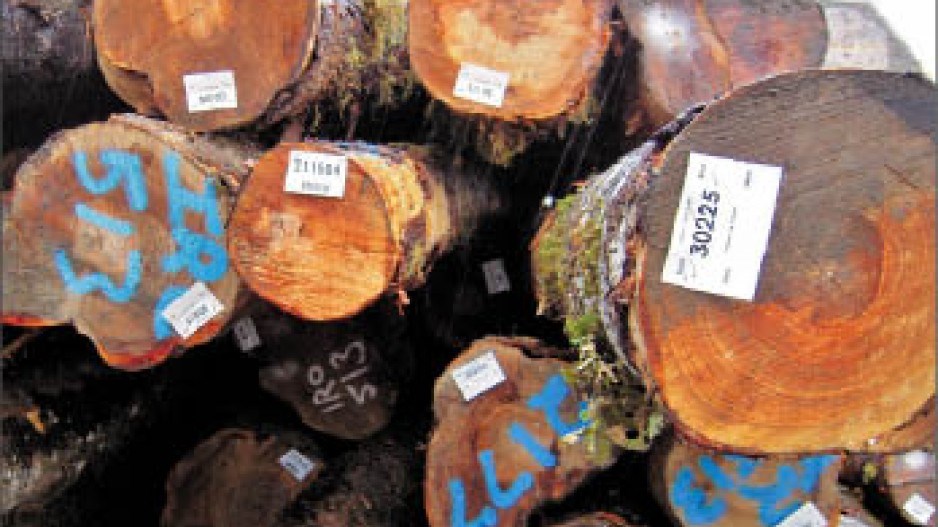Although 2011 has been a watershed year for B.C.�s softwood lumber industry, with China surpassing the U.S. as the province�s largest export market, critics say the hardwood sector has been left out of the loop.
�It�s never been more difficult than it is now,� said Doug Carl of CarlWood Lumber, a hardwood and softwood lumber supplier in Maple Ridge.
�Hardwood consumption in North America is tightly tied to the housing market in the U.S.,� explained Lance Blanco, CEO of Hardwoods Distribution Inc. (TSX:HWD). �If housing is at 25% of its peak production there, you can�t really say that anyone is doing �fine.��
But there are still buyers for B.C. hardwood products, including the Canadian housing and renovation markets.
In B.C., hardwood is derived from a mix of species, including red alder, Pacific Coast maple, western white birch, cottonwood and aspen.
But, last year, the hardwood industry billed a mere 2% of the volume that softwood billed in the province.
Most hardwood consumed in B.C. comes from the U.S., and none of the three major hardwood manufacturers (Northwest Hardwoods, Cascade Hardwood Group and Washington Alder) on the west coast are in B.C., yet all are doing well in spite of the downturn.
�They have developed a hardwood industry in Washington state, but in B.C. we don�t really have one,� said Russ Cameron, president of the Independent Wood Processing Association.
�In Washington state they�re planting and farming hardwood, but in B.C. it�s not even an idea.�
�There�s a big difference between the �big three� and everybody else,� said Tony Pistilli, a 25-year veteran of the hardwood industry in B.C., who credits – not the recession but a lack of supply – as the culprit. �There�s not enough logs to run the mills, and a lot of the smaller mills are going out of business.�
�Hardwood has never gotten its fair share of what it needs in B.C. to thrive,� said Pistilli, a B.C. Wood board member.
Although hardwood can mature in 40 years, half the time it takes softwood, it doesn�t compare in size with huge softwood trees such as cedar, fir and hemlock.
As a result, B.C. has hardwood supply shortage.
�All the major loggers want to log the big wood,� said Pistilli. �It�s a pain to process alder, and there�s not the big volume. Most logging operations ignore alder, or it�s felled and left to rot.�
B.C.�s surviving hardwood mills must buy their wood on the open market. But it�s subject to shortage because there are no separate stands of alder in B.C.
Mills must rely on the larger companies to sell them the alder or birch that grow around softwood stands. Hardwood supply is therefore inconsistent and unpredictable.
Pistilli said softwood companies shouldn�t be penalized for harvesting alder by having to report that harvest as part of their annual allowable cut, a measure the government uses to determine how much each company can harvest each year.
Another disadvantage hardwood companies face is their lack of tenure, and critics say there�s an absence of political will in B.C. to grant hardwood companies licences to log the wood.
The major softwood firms have been granted most of the licences.
Hardwood loggers can�t, for example, get a five-year logging plan with the B.C. government.
�They can�t even put a business plan together because the supply is so unreliable,� said Pistilli.
According to Cameron, government should take control of hardwood stands out of the hands of those �who aren�t interested in doing anything with it.�
He pointed to major forestry players such as Washington-based Weyerhaeuser (NYSE:WY), which retained hardwood tenure to supply a mill in Delta after the operation closed in 2008.
In addition, most of the large companies export hardwood as logs to Asia rather than sell them to the value-added sector in B.C.
�It�s cheaper for the Chinese to import fibre from B.C., manufacture it in China and sell it back to the dealers,� said Hans Boer, president of Wide Plank Hardwood in Chilliwack.
As a result, the province�s limited supply of hardwood also has to compete with exports.
Said Cameron: �There is no attempt to keep this wood in B.C.���




